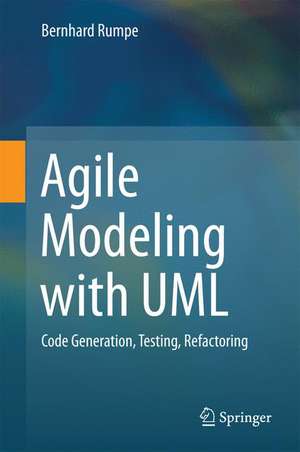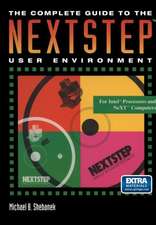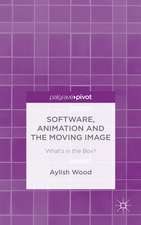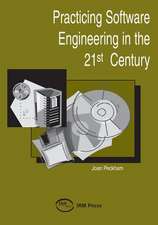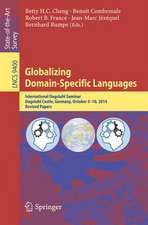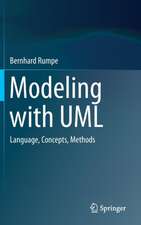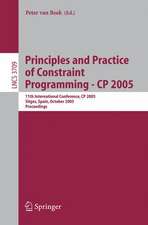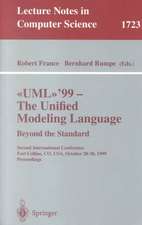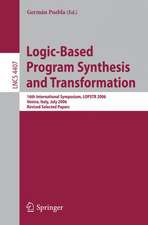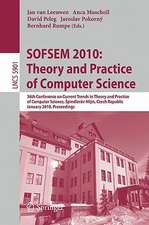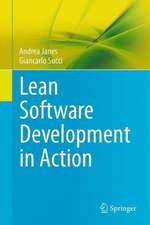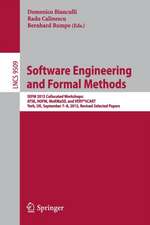Agile Modeling with UML: Code Generation, Testing, Refactoring
Autor Bernhard Rumpeen Limba Engleză Hardback – 4 mai 2017
This book focuses on the methodological treatment of UML/P and addresses three core topics of model-based software development: code generation, the systematic testing of programs using a model-based definition of test cases, and the evolutionary refactoring and transformation of models. For each of these topics, it first details the foundational concepts and techniques, and then presents their application with UML/P. This separation between basic principles and applications makes the content more accessible and allows the reader to transfer this knowledge directly to other model-based approaches and languages.
After an introduction to the book and its primary goals in Chapter 1, Chapter 2 outlines an agile UML-based approach using UML/P as the primary development language for creating executable models, generating code from the models, designing test cases, and planning iterative evolution through refactoring. In the interest of completeness, Chapter 3provides a brief summary of UML/P, which is used throughout the book. Next, Chapters 4 and 5 discuss core techniques for code generation, addressing the architecture of a code generator and methods for controlling it, as well as the suitability of UML/P notations for test or product code. Chapters 6 and 7 then discuss general concepts for testing software as well as the special features which arise due to the use of UML/P. Chapter 8 details test patterns to show how to use UML/P diagrams to define test cases and emphasizes in particular the use of functional tests for distributed and concurrent software systems. In closing, Chapters 9 and 10 examine techniques for transforming models and code and thus provide a solid foundation for refactoring as a type of transformation that preserves semantics.
Overall, this book will be of great benefit for practical software development, for academic training in the field of Software Engineering, and for research in thearea of model-based software development. Practitioners will learn how to use modern model-based techniques to improve the production of code and thus significantly increase quality. Students will find both important scientific basics as well as direct applications of the techniques presented. And last but not least, the book will offer scientists a comprehensive overview of the current state of development in the three core topics it covers.
| Toate formatele și edițiile | Preț | Express |
|---|---|---|
| Paperback (1) | 536.88 lei 6-8 săpt. | |
| Springer International Publishing – 25 iul 2018 | 536.88 lei 6-8 săpt. | |
| Hardback (1) | 543.31 lei 6-8 săpt. | |
| Springer International Publishing – 4 mai 2017 | 543.31 lei 6-8 săpt. |
Preț: 543.31 lei
Preț vechi: 679.14 lei
-20% Nou
Puncte Express: 815
Preț estimativ în valută:
103.98€ • 108.15$ • 85.84£
103.98€ • 108.15$ • 85.84£
Carte tipărită la comandă
Livrare economică 14-28 aprilie
Preluare comenzi: 021 569.72.76
Specificații
ISBN-13: 9783319588612
ISBN-10: 3319588613
Pagini: 388
Ilustrații: XIII, 388 p. 176 illus., 101 illus. in color.
Dimensiuni: 155 x 235 x 24 mm
Greutate: 0.74 kg
Ediția:1st ed. 2017
Editura: Springer International Publishing
Colecția Springer
Locul publicării:Cham, Switzerland
ISBN-10: 3319588613
Pagini: 388
Ilustrații: XIII, 388 p. 176 illus., 101 illus. in color.
Dimensiuni: 155 x 235 x 24 mm
Greutate: 0.74 kg
Ediția:1st ed. 2017
Editura: Springer International Publishing
Colecția Springer
Locul publicării:Cham, Switzerland
Cuprins
1 Introduction.- 2 Agile and UML-Based Methodology.- 3 Compact Overview of UML/P.- 4 Principles of Code Generation.- 5 Transformations for Code Generation.- 6 Principles of Testing with Models.- 7 Model-Based Tests.- 8 Design Patterns for Testing.- 9 Refactoring as a Model Transformation.- 10 Refactoring of Models.- 11 Summary, Further Reading and Outlook.
Recenzii
“This book, the second volume of the series, presents agile modeling with UML with a focus on code generation, testing, and refactoring. … Overall, the book is well structured and easy to follow. … This book provides excellent teaching material, and can be recommended for students and lecturers; in addition, experienced developers working on agile projects can use it as a guideline and to read about best practices.” (Computing Reviews, August, 2017)
Notă biografică
Bernhard Rumpe teaches at the RWTH Aachen University the use of agile, model-based development on the basis of UML. His research interests include models, modeling languages, DSLs, as well as their construction, analytical and generative use in development of products. With a number of publications, he has contributed to the standardization of UML and to a better use within development processes. He is author and editor of 21 books and Editor-in-Chief of the international Springer Journal on Software and Systems Modeling (SoSyM).
Textul de pe ultima copertă
This book focuses on the methodological treatment of UML/P and addresses three core topics of model-based software development: code generation, the systematic testing of programs using a model-based definition of test cases, and the evolutionary refactoring and transformation of models. For each of these topics, it first details the foundational concepts and techniques, and then presents their application with UML/P. This separation between basic principles and applications makes the content more accessible and allows the reader to transfer this knowledge directly to other model-based approaches and languages.
After an introduction to the book and its primary goals in Chapter 1, Chapter 2 outlines an agile UML-based approach using UML/P as the primary development language for creating executable models, generating code from the models, designing test cases, and planning iterative evolution through refactoring. In the interest of completeness, Chapter 3 provides abrief summary of UML/P, which is used throughout the book. Next, Chapters 4 and 5 discuss core techniques for code generation, addressing the architecture of a code generator and methods for controlling it, as well as the suitability of UML/P notations for test or product code. Chapters 6 and 7 then discuss general concepts for testing software as well as the special features which arise due to the use of UML/P. Chapter 8 details test patterns to show how to use UML/P diagrams to define test cases and emphasizes in particular the use of functional tests for distributed and concurrent software systems. In closing, Chapters 9 and 10 examine techniques for transforming models and code and thus provide a solid foundation for refactoring as a type of transformation that preserves semantics.
Overall, this book will be of great benefit for practical software development, for academic training in the field of Software Engineering, and for research in the area of model-based software development. Practitioners will learn how to use modern model-based techniques to improve the production of code and thus significantly increase quality. Students will find both important scientific basics as well as direct applications of the techniques presented. And last but not least, the book will offer scientists a comprehensive overview of the current state of development in the three core topics it covers.
Caracteristici
Addresses three core topics in model-based software development: code generation, testing, and refactoring of software Clearly distinguishes between concepts and techniques on one hand, and their implementation in UML/P on the other Mainly intended for practitioners and students, helping them learn the scientific basics of model-based software development for industrial code production Includes supplementary material: sn.pub/extras
